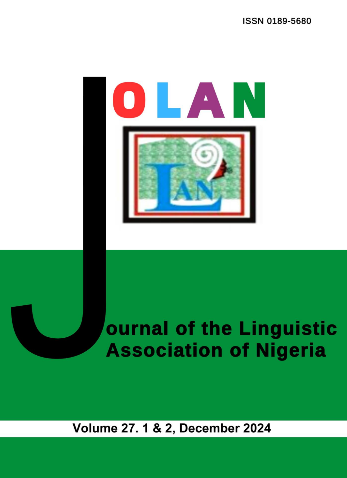Translation, Femality and Child Mortality in African Literature and their German Versions
Keywords:
Ogbanje/abiku, female, language gender sensitivity, translationAbstract
In the traditional African society, there exist various beliefs about the health conditions of young and old, male and female and the Ogbanje/abiku myth is one of them. Ogbanje/abiku phenomenon bespeaks the mysterious health challenge surrounding child mortality in the African context. Today medical explanations have been offered for it (Uche and Uche 2015) and this traditional belief is also present in African literary texts (McCabe 2002). However, there has been no study focusing on the representation of the female as a stereotype of ailing ogbanje/abiku in Anglophone African texts and their German translations. This study therefore examines how translation contributes to the representation of the female as the typical gender of ogbanje/abiku in five African Postcolonial literary works. The analysis is based on the theory of translation as an intercultural writing and works on gender sensitivity in the English and German languages. This is with the aim of showing that gender sensitivity in English and German languages plays a significant role in portraying and projecting the female as the stereotype of an ogbanje/abiku. The study concludes that gender sensitivity in a language plays a role in the discrimination against females in stereotyping them as typical of having such a health challenge in African Europhone literature.
References
Achebe, Chinua. Okonkwo oder Das Alte Stürzt. Trans. Richard Moering. Stuttgart: Verlag Wagenbach, 1959. Print.
________. Okonkwo oder Das Alte Stürzt. Trans. Dagmar Heusler and Evelin Petzold. Frankfurt am Main: Suhrkamp Verlag, 1983
________. Things Fall Apart. Lagos: Academy Press Ltd, 1984
________. The World of the Ogbanje. Enugu: Fourth Dimension Publishing Co. Ltd, 1986
________. Alles Zerfällt. Trans. Uda Strätling. Frankfurt am Main: S. Fischer Verlag GmbH, 2012
Aji, Aron and Ellsworth, Kirstin. "Ezinma: The "Ogbanje" Child in Achebe’s "Things Fall Apart" in: College Literature. Vol. 19/20. No. 3/1. Teaching Postcolonial and Commonwealth Literatures. (1993): 170 – 75. Print
Bakare-Yusuf, Bibi. “'Yorubas don’t do gender‘: A Critical Review of Oyeronke Oyewumi’s The Invention of Women: Making an African Sense of Western Gender Discourses”. African Identities. Vol.1. No. 1. (2003): 121 – 43
Bandia, Paul. “Translation as Reparation. Writing and Translation in Postcolonial Africa”. Manchester: St. Jerome Publishing, 2008
Bandin, Elena. “The Role of Self-Translation in the Decolonisation Process of African Countries”. Web 16 November 2016 https://dialnet.unirioja.es/descarga/articulo/897175.pdf
Bassnett, Susan and Trivedi, Harish. “Post-colonial Translation. Theory and Practice”. London and New York: Routledge, 1999
Emecheta, Buchi. “The Slave Girl”. Great Britain: Villiers Publications Ltd, 1977
__________. “Sklavemädchen”. Trans. Susanne Koehler. Wuppertal: Hammer, 1995
Emenanjo, Nolue. "Elements of Modern Igbo Grammar". Ibadan: Oxford University Press, 1978
Fatokun, Samson and Hofmyer, Hoffie. "African Christians‘ Attitudes To African Traditional Belief in Rebirth (Reincarnation): A Critique". Web 1 December 2015 www.theses.xlibx.info/t1-history/1100558-1-abstract-while-christianity-does-not-anyway-support-the-concept.php
Guimei, He. "An Analysis of Sexism in English". Journal of Language Teaching and Research. Vol. 1. No. 3. (2010): 332 – 35
Ilechukwu, Sunday. "Ogbanje/Abiku and Cultural Conceptualizations of Psychopathology in Nigeria". Mental Health, Religion & Culture. Vol. 10. No. 3. (2007): 239 – 55
Maduka, Chidi. "African Religious Beliefs in Literary Imagination: Ogbanje and Abiku in Chinua Achebe, J. P. Clark and Wole Soyinka". Journal of Commonwealth Literature. (1987): 17 – 30. Web 5 December 2015
McCabe, Douglas. “Histories of Errancy: Oral Yoruba Abiku Texts and Soyinka’s "Abiku"”. Research in African Literatures. Vol. 33, No. 1. (2002) 45 - 74
Nzewi, Esther. “Malevolent ogbanje: Recurrent Reincarnation or Sickle Cell Disease?” Social Science and Medicine. Vol. 52. (2001): 1403 – 16
Okonjo Ogunyemi, Chikwenye. “Africa Wo/Man Palava: The Nigerian Novel by Women”. Chicago: University of Chicago, 1996
Okri, Ben. “The Famished Road”. Great Britain: Jonathan Cape Vintage, 1991
Oyewumi, Oyeronke. "The Invention of Women: Making an African Sense of Western Gender Discourse“. Minneapolis: University of Minnesota Press, 1997
Soyinka, Wole. “Ake. Years of Childhood”. London: Rex Collings, 1981
_________. “Ake. Jahre der Kindheit”. Trans. Inge Uffelmann. Zürich. Ammann Verlag & Co, 1986
Stahlberg, Dagmar and Sczesny, Sabine. "Effekte des generischen Masculinus und alternativer Sprachformen auf den gedanklichen Einbezug von Frauen". Psychologische Rundschau. Vol. 52, No. 3 (2001): 131 – 40
Tutuola, Amos. "My Life in the Bush of Ghosts". New York: Grove Press, 1954
________. "Mein Leben im Busch der Geister". Trans. Wulf Teichmann Berlin: Alexander Verlag, 1991
Tymoczko, Maria. "Post-Colonial Writing and Literary Translation: Theory and Practice. London and New York: Routledge, 1999
Uche, Oliver and Uche, Martina. (2015). "The Medical and Social Dynamics of Ogbanje as an Occult and Paranormal in Nigeria" in: African Journasl Online. Web 5 December 2015
www.ajol.info/index.php/jrhr/article/viewFile/105151/95193
Venuti, Lawrence. "The translation studies reader". London: Routledge, 2003
Websites
http://en.wikipedia.org/wiki/Ogbanje (13/10/2015)
www.jcl.sagepub.com/content/22/1/17.citation (05.12.2015)














